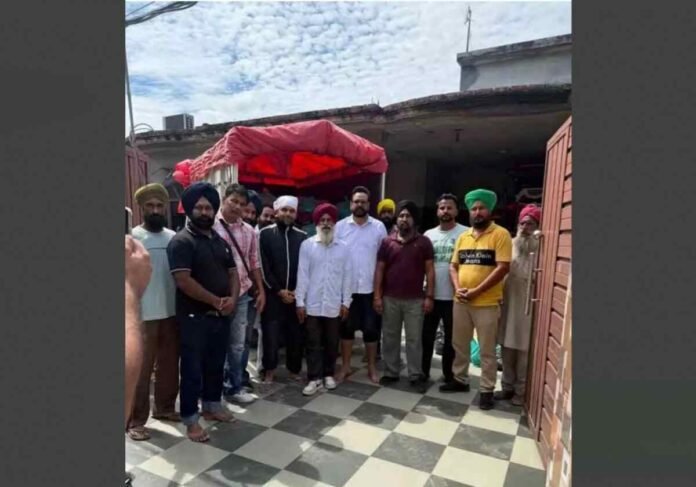Punjabi singer and songwriter Guru Randhawa has always carried his homeland close to his heart. Known globally for his chart-topping music and charismatic performances, Randhawa is equally recognized for his humility and his commitment to the people of Punjab. Time and again, he has used his influence not only to entertain but also to uplift communities in distress.
The recent floods in Punjab left behind a trail of destruction—damaging homes, displacing families, and destroying thousands of acres of farmland. While relief efforts came from several organizations and individuals, Guru Randhawa stood out for his deeply personal and heartfelt response to the tragedy.
Early Steps: Rebuilding Lives, One Home at a Time
Even as rescue and relief operations were underway, Randhawa was among the first to extend support to affected families. One story that touched many was his pledge to rebuild the home of a mother who lost her shelter in the devastation. This promise was more than just financial aid—it reflected the singer’s emotional commitment to restoring dignity and security for families who had lost everything overnight.
Such actions highlighted that Randhawa’s philanthropy goes beyond symbolic gestures. His efforts are rooted in empathy and a desire to directly address the pressing needs of those affected.
A New Initiative: Distributing Wheat Seeds
Taking his commitment a step further, Randhawa has now announced a forward-looking initiative aimed at reviving Punjab’s agricultural backbone. Once the floodwaters recede and life begins to normalize, he plans to distribute wheat seeds to farmers across flood-affected villages.
This initiative is significant for several reasons. Agriculture is the primary livelihood for many families in Punjab, and the floods have wiped out standing crops, washed away fertile soil, and left farmers uncertain about the upcoming sowing season. By providing wheat seeds, Randhawa hopes to give farmers a chance to rebuild not just their fields but also their hopes for a stable future.
In his own words, Randhawa expressed,
“Once the flood ends and the water level goes down, I will distribute wheat seeds to the affected villages so the next crop can be sown, and people can make a fresh start.”
Why Wheat Seeds Matter
For Punjab, often called the “breadbasket of India,” wheat is not just a crop—it is the lifeline of the state’s agricultural economy. A ruined sowing season can push families into debt traps and financial uncertainty for years. Randhawa’s decision to provide seeds directly addresses this crucial gap.
Unlike short-term relief such as food or cash handouts, distributing wheat seeds empowers farmers to take charge of their future. It ensures that they can restart cultivation, produce their own food, and generate income from their harvests. In essence, it transforms aid into opportunity.
A Gesture Beyond Charity
Randhawa’s move reflects more than charity—it showcases a deep understanding of Punjab’s culture and economy. Having grown up in a farming state, he knows how vital agriculture is to the identity of its people. By investing in seeds, he is investing in self-reliance and dignity, values that resonate strongly with the farming community.
Moreover, this act reinforces his image as a public figure who does not just sing about Punjab but stands firmly with it in times of crisis. For his fans and followers, it is a reminder that true stardom lies not only in fame but also in responsibility.
Connecting with the People
Throughout the floods, Randhawa has actively shared glimpses of the situation on his social media platforms. By doing so, he has not only raised awareness about the severity of the crisis but also encouraged collective prayers and support. His words urging everyone to “pray for better days ahead” reflect his role as both an artist and a humanitarian who speaks directly to the emotions of his people.
Social media also allows him to connect personally with affected families, amplifying their stories and needs to a wider audience. This bridge between celebrity and community has made his interventions more impactful and relatable.
The Larger Impact of Celebrity Humanitarianism
Randhawa’s initiative also underscores the growing role of celebrities in humanitarian efforts. In times of crisis, the involvement of popular figures can amplify relief efforts, inspire solidarity, and attract attention to regions that may otherwise struggle to get the spotlight.
By announcing the distribution of wheat seeds, Randhawa is not only offering practical help but also setting an example for other artists and public figures to leverage their influence for social good. His actions may inspire similar initiatives, creating a ripple effect of kindness and responsibility.
Looking Ahead: Seeds of Hope
As Punjab begins the slow journey of recovery, initiatives like Randhawa’s bring much-needed hope to communities devastated by the floods. The distribution of wheat seeds is symbolic of resilience—just as seeds sprout into new life, the people of Punjab too will rise again, rebuilding their homes, farms, and futures.
For Guru Randhawa, this initiative is more than a charitable act—it is a reaffirmation of his bond with Punjab. It demonstrates that even as his music echoes across international stages, his heart remains firmly rooted in the fields of his homeland.
Conclusion
Guru Randhawa’s announcement to provide wheat seeds to flood-affected farmers is a timely and thoughtful step toward long-term recovery. While short-term relief is vital, it is initiatives like these that ensure sustainable rehabilitation for communities in crisis. His efforts highlight a powerful message—that healing after a disaster is not just about rebuilding structures, but also about nurturing resilience, dignity, and self-reliance.
In standing with the farmers of Punjab, Randhawa proves that compassion, when paired with action, can sow the seeds of hope for generations to come.

